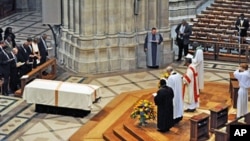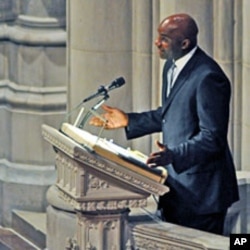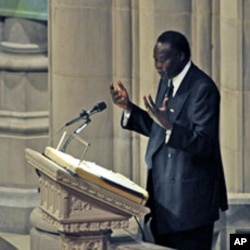A funeral was held on Tuesday for former National Basketball Association star Manute Bol at Washington's National Cathedral. The towering shot blocker from southern Sudan was remembered more for his off-the-court humanitarianism than for his on-the court play.
In death as in life, Manute Bol towered above others. His specially made 2.44-meter-long casket was covered in a white pall emblazoned with red crosses as it was wheeled into the massive gothic cathedral.
Bol died on June 19 at age 47 from kidney failure brought on by a skin condition attributed to medical care he received while traveling in his native Sudan.
Bol joined the Washington Bullets, now called the Wizards, in 1985. By the time he retired 10 seasons later, Bol had amassed 2,086 blocked shots and 1,599 points - the only NBA player with more blocks than points scored.
Rory Sparrow, the NBA's vice president of Player Development, told mourners that not even Michael Jordan was able to intimidate the smiling Dinka tribesman.
"I remember one time when we were teasing him at one game. I was playing for the [Chicago] Bulls and I was teasing him about what Michael Jordan was going to do to him," he said. "And he just laughed and he said, 'What Michael Jordan? Why should I be afraid of Michael Jordan? I kill lion. He come in, I block his shot.' And sure enough, he blocked his shot. Michael made a couple of dunks, but hey, Manute stood his ground," said Sparrow.
Bol was later traded to Golden State. He later played for Philadelphia and Miami before returning to Washington. His highest NBA salary was $1.5 million per year. While in Washington, he often protested at the Sudanese Embassy to draw attention to his home country's civil war. When he returned to Sudan in 1998, Bol supported a large extended family. He gave more than $3.5 million to a Dinka-led rebel group in Southern Sudan, and later lost his fortune, and was forced to sell his house and possessions. A political dispute left him in virtual exile in his country.
By 2001, Bol was almost destitute. He sometimes appeared in promotional stunts, such as a boxing match against former Chicago Bears defensive lineman William "Refrigerator" Perry to raise funds for his homeland. He said at the time he did it to save people's lives, not for the money.
Bol was later admitted to the United States as a religious refugee where his rent in Connecticut was paid by a Catholic charity. The former NBA star was nearly killed in a 2003 car accident. But Bol's experiences led him to rededicate himself to helping others, particularly children and the dispossessed in Sudan. His goal was to build 41 schools across the country.
Akec Khoc, Sudan's ambassador to the United States, said Bol did not dwell on his setbacks. Instead, he showed kindness to everyone.
"He gave his time to children, to the poor, to the displaced, to the helpless, to the sick everywhere," he said.
Manute Bol later moved from Connecticut to Kansas, where he lived in recent years. Kansas Senator Sam Brownback said that the quiet, towering basketball star was not preoccupied with his own wealth, fame or misfortune. He said Bol's concern was helping the poor and needy, and reconciling former enemies in his native country.
"I can't think of a person that I know of in the world that used their celebrity status for a greater good than what Manute Bol did. He used it for his people, he gave his life for his people," said Brownback.
Manute Bol worked with Sudan Sunrise, which seeks to help bring about reconciliation between Christians, animists and Muslims in Southern Sudan.
Sudan Sunrise founder, Reverend Canon Tom Prichard, says Bol's work to reconcile former enemies lives on.
"Manute's legacy and vision of education and reconciliation, his determination to grow grassroots reconciliation - whether that reconciliation is expressed in a country that divides or holds together, wherever the boundary lines are drawn. Manute stood for grassroots reconciliation," said Prichard.
Manute Bol's family patriarch, Bol Bol Chol, praised his nephew's efforts to bring about reconciliation between Muslims and Christians in Sudan - including Darfurians, who, he said, killed as many as 250 of Bol's relatives.
"This man is not an ordinary man. I believe this man is a messenger like others messengers who were sent into this world - to do something in this world. He has accomplished most of his mission, and so God took him and left the rest of the work to be done by others," said Chol.
Manute Bol's remains will be flown to Sudan where they will be interred near his grandfather in a family cemetery.






